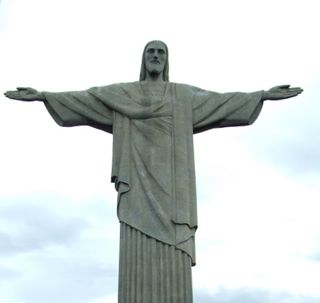Jesus Mortal |
|
 |
|||||
bishop Greek orthodox and Roman catholic bishops trace their lines back to bishops purportedly installed by the apostles themselves (apostolic succession). According to Matthew, Jesus conferred heavenly authority on these apostles, and the bishops claim that authority for themselves. Christian bishops are unique among religious leaders for the authority they have wielded, not only over doctrine and morals but in worldly affairs as well. From the mid-100s to the 1500s, the Christian churches were universally led by bishops. A bishop has monarchical authority over his territory, and the bishops of more powerful cities are more powerful themselves. The east-west schism was partly a power struggle between the Latin bishop of old Rome (the pope) and the Greek bishop of new Rome, Constantinople. Bishops, as a group, claim authority over the church, and they wear outlandish outfits to display their status. The church councils of the 300s and 400s, which defined orthodox Christian doctrine, were primarily the work of bishops. In the west from the 1200s to the 1400s, bishops even made a play for authority over the pope, but the pope won out. Some Protestant churches have church leaders called bishops, but they’re not bishops in the traditional sense. Bishops look to scripture to back up their claims to spiritual supremacy, but the “bishops” (superintendents) in the new testament are the same thing as “priests” (presbyters, elders), not the priests’ bosses. Originally, bishops and priests were two words for the same thing. The words meant “overseers” and “elders,” referring to the senior, leading members of a congregation. They were helped by the deacons (servants). In the 100s, however, bishops and priests split into two levels, with monarchical bishops ruling over numbers of priests. In the heresy wars of the 100s, it was really handy to have a single bishop for an area, someone who could claim apostolic authority and lay down the law. One might take bishops as the opposite of Jesus. Jesus was poor, autonomous, itinerant, charismatic, and defiant of social expectations. Bishops have been wealthy, hierarchical, territorial, ritualistic, and worldly. Jesus’ authority was his wisdom, but the bishop’s authority is his ecclesiastical status. The bishops enforce doctrinal compliance to creeds that Jesus wouldn’t recognize. He said the last shall be first, whereas the bishops are happy for the first (themselves) to retain that position. Jesus said not to call spiritual authorities “father,” but the bishops decided that they liked the sound of the word. The bishop is a fine symbol for everything un-Jesus-like about Christianity.
Read comments or make a comment here. |
|||||
contents table of contents you're already looking at it introduction for the inquisitive reader biographical overview who he was and wasn't
afterlife not Jesus' concern animal sacrifice bloodless religion apocalypse did Jesus preach hellfire? baptism sin wash for Jesus and others beatitudes Jesus' words and others' words beloved disciple witness for the un-gospel bible scripture old and new bishop the unjesus body focus on the physical Buddha Jesus' close kin charity key Christian virtue and legacy of Jesus The Da Vinci Code secret (and false) messages divorce women's status dreams convenient literary device Elijah Jewish prophet with his own second coming equality ancient source of modern egalitarianism exorcist Jesus and demons failure reinterpreting Jesus as a failure faith from trust to blind belief father Jesus on titles of honor Francis of Assisi the most Christlike Christian Gandhi the 20th century's most Christly holy man Galilee Jesus' inauspicious homeland gentiles Jesus' inadvertent audience god how Jesus became god golden rule key to Jesus' success gospels competing accounts heaven from sky to spiritual home hell revenge fantasy humanism Jesus' legacy inerrant Christian treatment of scripture Thomas Jefferson ethics of Jesus Jewish guilt Christian libel John's gospel the un-gospel John the baptist, see John the washer John the washer Jesus' apocalyptic mentor Judaism libeled religion of Jesus kingdom of god what Jesus promised Lao Tzu poet of the cosmic way logos jesus as the word of god C. S. Lewis famous, flawed trilemma little drummer boy Luke beats Matthew logos Jesus as the divine word LORD Yahweh transitioning to the one god of all Luke's gospel the all-around best gospel Mark's gospel the gospel that lost its point Mary of Magdala women, visions, and sex massacre of the innocents bloodshed starts early Matthew's gospel best gospel for church reading Mormon, see Joseph Smith Moses Jewish lawgiver Muhammad a prophet who got it right mystery Orpheus and transubstantiation oppression origin of Jesus' compassion The Passion of the Christ Luke as buzzkill Paul revealer of the revealer private and public public Jesus and secret Christ relativism the secret power of the golden rule sacrifice Jesus' death and Christian sacrament Albert Schweitzer Jesus as a failure sheol dark pit of death show Jesus' deeds as put-ons slavery abolished by Jesus' efforts Joseph Smith flesh-and-blood Jesus Socrates secular Jesus son of god on close terms with the man upstairs soul, see body synoptics three gospels that agree temple center of Jewish religion trinity unifying and divisive doctrinre vision, see dreams Yahweh, see LORD Zoroaster Persian dualistic holy man
|
|||||